
Opening our balcony doors at Lisbon’s Bairro Alto Hotel during the day, my companion and I enjoyed the excited hustle and bustle below on the iconic, tree-lined Praça de Camões square.
Closing them at night, we enjoyed undisturbed silence, the perfect recipe for sound sleep.
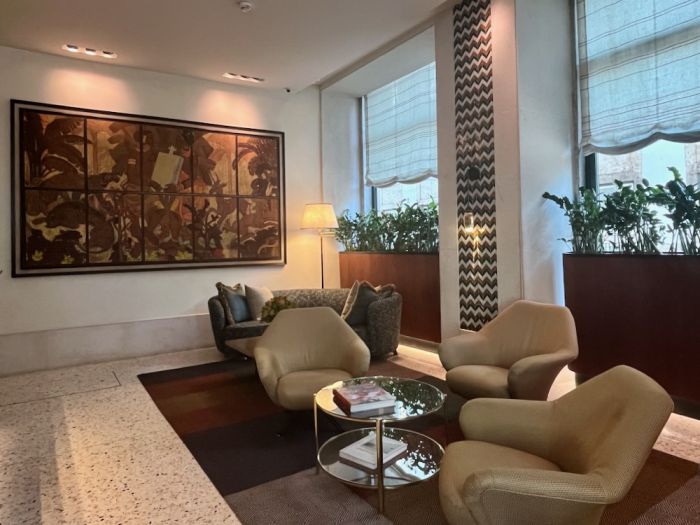
Occupying an entire block of four buildings that was partly derelict, this 87-room, 5-star hotel stands at the border between two historic neighborhoods - the elegant shopping district of Chiado and the bohemian bars-and-cafes Bairro Alto.
Though refurbished at a cost of over 32 million euro with all the mod-cons and reopened five years ago, the hotel still breathes an air of art deco elegance, from the metallic pattern in the elevators to discreet frescoes on some of the lobby walls.

There is also a delightful carved wood spiral staircase stretching up from a discreet boutique cafe serving coffee with pastries and snacks such as creamy Portuguese custard tart (pastel de nata), almond and egg cream pastry (Jesuíta) and wine and garlic chicken pie (empada de frango em vinha d’alhos) to a quiet Mezzanine level that offers a cosy leisure space for guests reminiscent of a luxury yacht with a modest library of magazines and books.
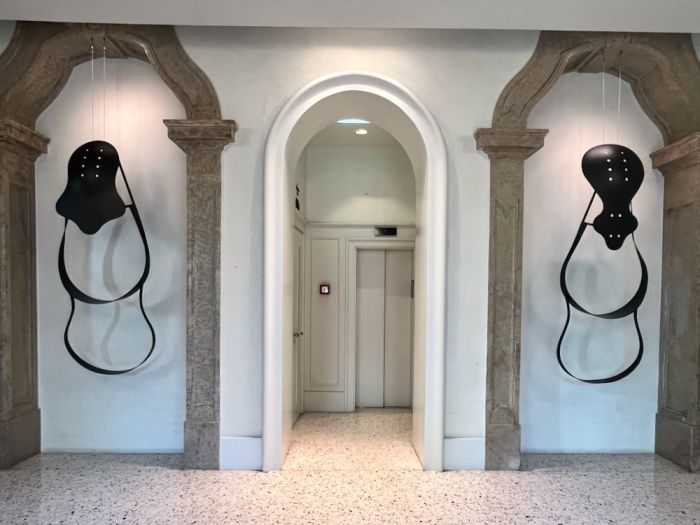
Overall, furnishings throughout the hotel present a mix of wood, wicker, tile and marble, artisanal rugs, antiques, classical paintings, sculptures and modern lighting. A huge tapestry, with a macramé base, by Oficina 166 (Diana Menezes Cunha) occupies a wall extending over three floors, its design relating to the city’s various hills.
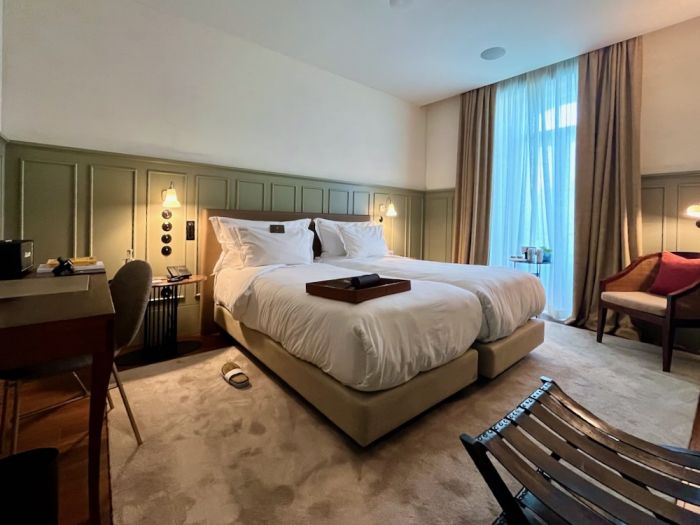
Highlight of our room, 408, was its wrought-iron balcony overlooking the decoratively tiled square with the statue of Luís de Camões, one of Portugal’s leading poets, in its centre. Reminiscent of Piccadilly Circus (with lighter traffic), this is a popular gathering place for people - tourists, buskers, joggers, singers and tour guides. Our fourth-floor room offered an envious viewing-point to capture the vibrant, ever-changing scenes below.

Duck-egg walls, hardwood floor, leather-clad rubbish bin, black turn of the century lighting switches and a hand-painted bird on the wall helped grant our room its own personality. Other furnishings included a framed oblong wall mirror in the hallway, an armchair in one corner, a wall TV and a work desk and chair. Our marble and tiled bathroom featured Le Labo toiletries, a vintage rotund wash-hand basin and step-in shower.
As little things matter, mention should be made of the hotel’s attention to room service details including its selection of pillows, free natural digestion capsules as well as complimentary stamps and postcards, even cloth wipes for eye-glasses.
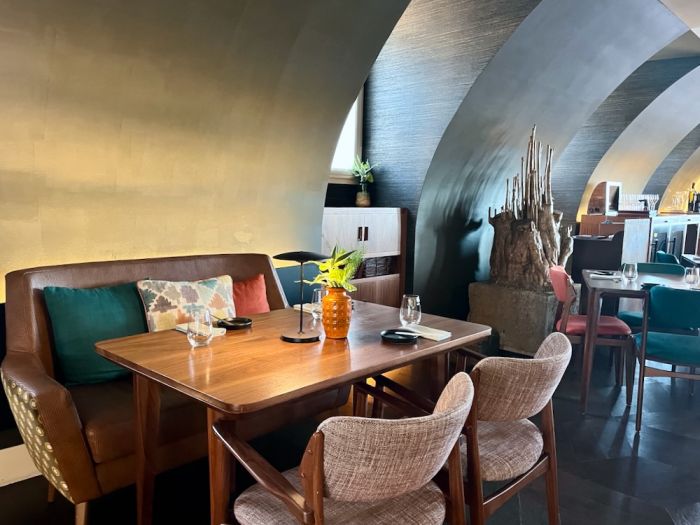
Dining is at Bahr restaurant on the 5th floor, reached by one of two elevators, the other going to a 6th floor rooftop bar. Both places have outdoor patios with panoramic views over the city and the River Tagus.
Before moving inside, we enjoyed pre-dinner cocktails alfresco with a snack of barnacles on toast while watching the sun slowly set. The oval-shaped interior is of contemporary design with minimalist decor, with white, marble-topped tables and a hardwood floor.
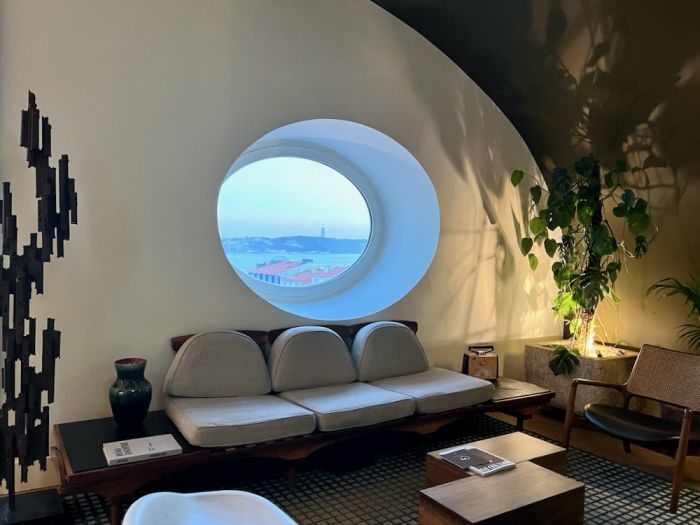
Artefacts near the entrance, including a traditional comb, knife, demijohn of red wine and a shoeshine bench, harken back to early bohemian life in the district. At the far end is is a spacious open kitchen with a surround of ‘Jupiter’ high stools, where I counted seven chefs working on a busy Saturday evening.
The leather-bound food and drinks menu is varied, comprising several pages.
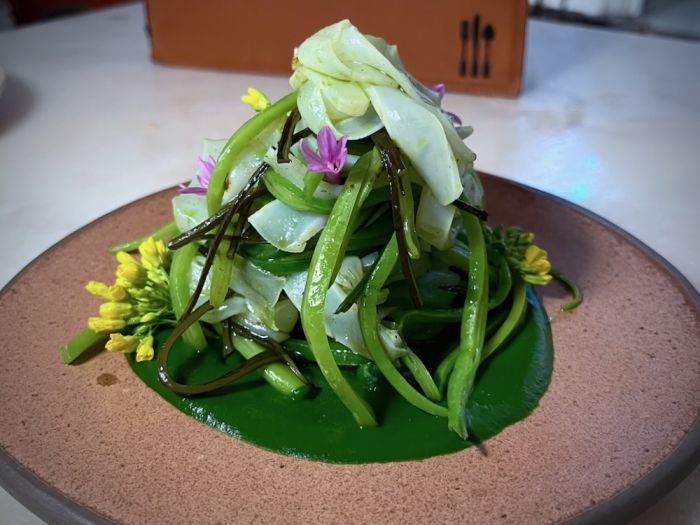
My companion chose ceviche of tuna with watercress and edamame (steamed soya beans) while I opted for grilled squid which arrived as a small mound of runner beans, turnip tops and seaweed with thin slices of the sea creature interspersed throughout.
With the emphasis on seafood, other starters included tuna sashimi and crab cracker but there was also fried potato tatin with char siu, a Cantonese-style of barbecued pork, and piri piri chicken.
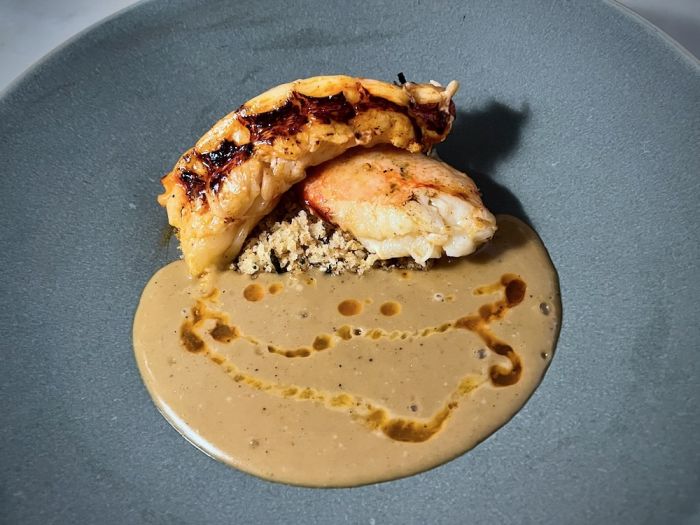
Beware of the cover bread, the fragrant wheat and oats sourdough variety with seaweed crackers and delicious butter is addictive.
Mains ranged from roasted octopus and Thai pasta stew to Iberian pork and Alentejo lamb with eggplant. My companion chose blue lobster, which came as two generous slices, jacket-less, body and claw. The accompanying bisque-like sauce based in part on marrare, a 19th century classic recipe prepared with meat stock and cream. I chose beef loin aged 35 days with a crunchy chestnut puree and Szechuan sauce.
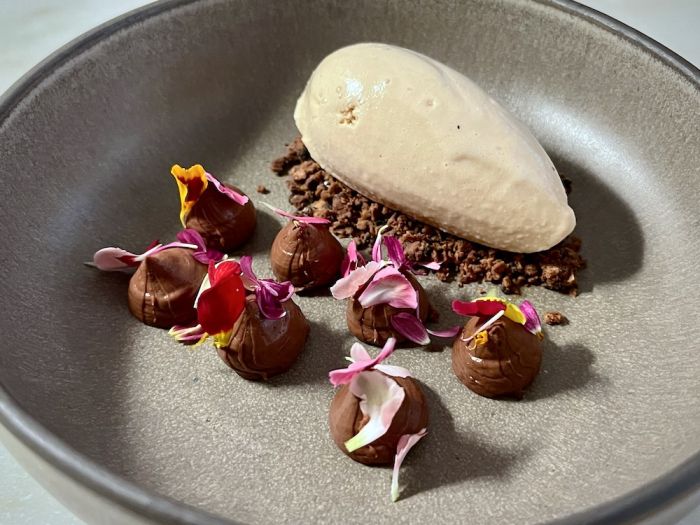
For businesses, the hotel also provides four elegant meeting rooms in a quiet wing of the building. The hotel also has a wellness centre with gym, sauna and a double massage room.
Aside from its fine design by prize-winning architect, Souto de Moura, and interiors by Atelier Bastir, prized location sets the Bairro Alto Hotel apart. ‘Bairro’ means ‘neighborhood’ and this central one, set on a hill, dates back 500 years. Here locals and travellers pack its narrow cobblestone streets to socialise outside countless bars. From here, Chiado, Lisbon's shopping and theater hub, is a minute’s walk away as are impressive 18th buildings such as the Bertrand Bookstore, opened in 1732 and reportedly the oldest bookstore in the world, and the National Theatre of São Carlos with its rococo decorations.









